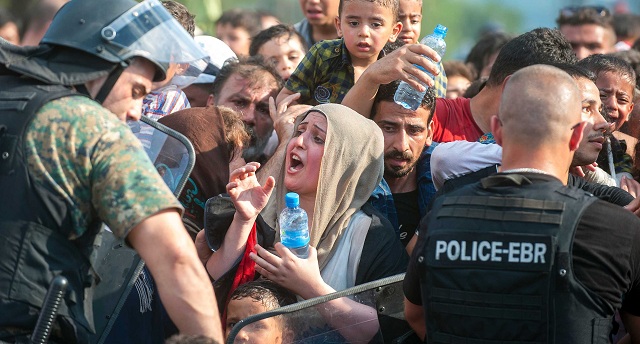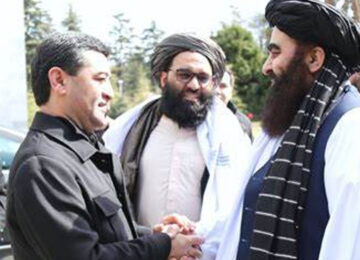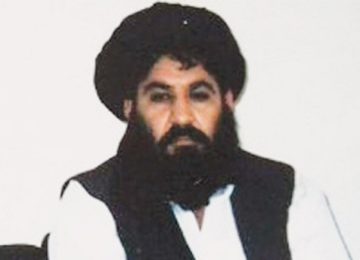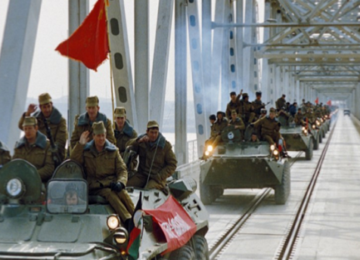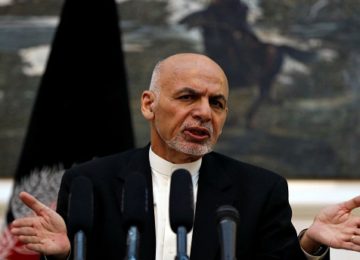Many Afghan migrants have been opting to travel through Bulgaria, a country bordering Turkey, on their journey to western and northern Europe. This route, while safer than a sea crossing, comes with its own terrifying experiences, as first-hand testimonies of migrants collected by different human rights organisations have shown. In Bulgaria, Afghan migrants are not only in danger of being attacked by vigilante groups or push back to Turkey, as the reports have shown, but they are also more likely to receive unfair treatment at the hands of the national migration authorities, AAN’s Jelena Bjelica discovered on a recent visit to the Bulgarian capital, Sofia. She also found that many of them eventually end up being returned to Afghanistan by force or under pressure.
Afghans in Bulgaria
Bulgaria, an EU member-country at the southern border of the Union, has seen an unprecedented movement of migrants between its own south-eastern border with Turkey and its western border with Serbia, since 2015. According to a joint annual border monitoring report by the UNHCR, Bulgarian Helsinki Committee and the Bulgarian General Border Police Directorate with the Ministry of Interior, the police detained a total of 34,056 irregular migrants (the majority of whom were Syrians, Afghans and Iraqis) who were attempting to cross the Bulgarian border illegally in 2015. Of these, 26,939 had submitted applications for international protection to the border or immigration police (see here). The country remained the preferred land route for refugees after the closure of what was dubbed the Balkan humanitarian corridor in early 2016, which stretched between Greece, Macedonia, Serbia and Hungary and later extended to Croatia (see this AAN analysis).
Afghans in particular favour the route through Bulgaria. In 2016 they made up over half of the 18,884 migrants apprehended there. These numbers were in fact lower in 2016 than in 2015 as the number of refugees arriving in Europe had decreased that year (see this AAN analysis).
Testimonies from Afghans collected by numerous media (see here, here and here) and the human rights organisations (see the Human Rights Watch report here and the Belgrade Centre for Human Rights report here, as well as the Are You Syrious report here) reveal that most of them experienced humiliation, maltreatment and abuse by the Bulgarian authorities. This includes police extortion and robbery; ‘push-backs’ to Turkey (the most frequent expulsion method allegedly applied by the Bulgarian police authorities was forcibly returning migrants picked up near the Turkish border, while ensuring that a Turkish border patrol would take them further into Turkish territory; see here), indefinite detention in spite of official requests for asylum, a lack of access to legal aid and a low rate of accepted asylum applications. Afghans and others also experienced attacks by private, government-tolerated vigilante groups (see also this AAN analysis).
Asylum claims and ‘punitive detentions’
Afghan claims for asylum in Bulgaria have often been rejected without fair consideration and applicants have often been persuaded to give up their claims and return to Afghanistan, lawyers from three different legal aid organisations in Bulgaria pointed out to AAN. This has resulted in a situation whereby Afghans make up the biggest number of asylum seekers in Bulgaria, while their recognition rate is negligible. (1) The rate is also one of the lowest in the EU (only 2,5 per cent in 2016, compared to an EU average of 56 per cent).
Afghans, instead, are put into detention centres (2) and often pressurised into returning home. This practice of ‘punitive detention’ dates back to the riots in the Harmanli camp near the Bulgarian-Turkish border in late 2016. Harmanli made Bulgarian and international headlines in November 2017, when Bulgarian Prime Minister Boiko Borisov said they had arrested some 300 Afghan migrants after they had protested against poor living conditions in the camp and clashed with the police. Iliana Savova from the Bulgarian Helsinki Committee told AAN that the riots had been a turning point in Bulgaria’s public opinion and consequently its treatment of Afghans. Since then, she said, Afghans have been detained more frequently than other nationalities and kept in detention for longer periods of time. “There is a general assumption in Bulgaria that Afghans are not eligible for asylum status,” she concluded.
This unfavourable treatment is even evident in the latest statistics released by the Bulgarian Ministry of Interior. By 31 October 2017, the ministry reported a total of 2,678 third-country nationals detained so far this year. Of this number, 39,3 per cent were Afghans, making them the top nationality among all foreign nationals detained. (Many of the Afghans detained have been returned by force or voluntarily to Afghanistan; more on this below.)
Diana Daskalova, a lawyer from the Centre for Legal Aid – Voice in Bulgaria, one of the two small organisations that work inside the detention centres (the second one is the Foundation for Access to Rights), pointed out to AAN that many violations take place in those facilities. She said that migrants often do not receive sufficient information about their rights in the asylum process (which partly has to do with the fact that the non-governmental organisations are too small to cover all the applicants) and that migrants are often subjected to “systematic psychological pressure,” which eventually makes them consent to returning to their home country. Even after they register an asylum claim, Daskalova says, Afghans are not usually moved to open centres as they are in many other European countries, but instead are kept in detention.
Bulgaria amended its national asylum law to introduce the detention of asylum seekers on 1 January 2016. Until then, Bulgarian legislation had not formally envisaged the detention of asylum seekers. In practice, however, they had been frequently detained as irregular immigrants (see this EU migration law blog by Valeria Ilareva, the head of the Foundation for Access to Rights). Ilareva pointed out that with regard to asylum seekers, however, neither the EU legal framework, nor Bulgarian national law, “provide for an exact time limit of the length of detention,” but that under the EU Return Directive 2008/115/EC, “a maximum time limit of detention of 18 months, which has also been adopted in Bulgarian law” is stipulated. She further explained how the system in Bulgaria works:
[…] Under the amendments in the asylum legislation, the competent authority for issuing detention orders for asylum seekers is the head of the State Agency for Refugees (or an official authorized by him), who is also the decision-making body on the applications for international protection in the country. […]
Usually, asylum seekers who have entered the country irregularly are immediately issued a removal order and detained for the purpose of its execution. It is against this background that asylum seekers make their applications for international protection, often from within the detention centre for irregular immigrants. Their asylum application is forwarded to the State Agency for Refugees, which is the competent institution to register the third country nationals as asylum seekers and accommodate them in the reception centres for asylum seekers. For the latter there is no time limit in national law, which makes access to the asylum procedure arbitrary: registration as asylum seeker might take from several days to several months (if the asylum seekers’ removal order has not been carried out in the meantime). By national law, upon registration as asylum seeker, the implementation of one’s removal order is suspended until a final negative decision on the asylum application enters into force.
The State Refugee Agency’s (SAR) asylum decisions, lawyers in Bulgaria say, are made after a court hearing. The SAR decisions are based on their own country of origin’s situation reports, which are not public documents. (3)
The unfair treatment of Afghan nationals by the Bulgarian authorities was also highlighted in a recently leaked letter sent by the European Commission to the Bulgarian State Agency for Refugees and the Ministry of Interior in July 2017, as the online publication Balkan Insight reported. The letter sent by the director of the Commission’s Migration and Protection Directorate, Laurent Muschel, on 6 July 2017, noted that Bulgaria’s recognition rate of Afghan nationals is “strikingly low compared to the rate of recognition (granting of international protection status) for the same nationality in other EU countries.”
The letter also confirms:
Particular concerns have also been expressed by stakeholders about the fact that Afghan nationals are apparently often detained for lengthy periods and to a considerably greater extent than occurs for other nationalities.
Even though Bulgaria is under increased political pressure from its European counterparts to improve its treatment of migrants, and in particular Afghans, only 356 Afghans are currently housed in reception centres in the country (the figures, as of 19 October 2017, provided by the Bulgarian Helsinki Committee).
Police extortion and push-backs
The European border agency, Frontex, reinforced its presence in Bulgaria in August 2016, but push-backs – prohibited by international refugee and human rights law, ie the non-refoulement principle (4) – are still happening to Turkey, a worker with an international organisation in Bulgaria told AAN. The level of the police violence in 2017, which has been well documented in the past, however, has seen a decrease. (5)
Bulgaria’s track record of police abuse since 2015 has been well documented. Reports by Human Rights Watch and the Belgrade Centre for Human Rights put forward detailed accounts supported by first-hand testimonies. (6)
During its research trip to Belgrade in June 2016, AAN also documented the stories of Afghans who came through Bulgaria and experienced police brutality. A young Afghan who had travelled from Teheran told AAN:
When we got into Bulgaria we had to walk for three nights and four days. We were with 30 Afghans. There were families and also an old man and an old woman. Some boys had to carry the old woman. In Bulgaria the police got us. A car was supposed to pick us up and bring us to Sofia. [The smugglers] said it would take one hour, but in the end we had to sleep in the forest. There the Bulgarian police found us. They brought us back to the Turkish border at around midnight. We tried to make a fire, but it was raining. The police had taken all our food and money, and they beat us before they released us. It rained till morning.
Bulgarian police brutality has even been documented in an art project, run by the prestigious Belgrade-based Centre for Cultural Decontamination. Ahmad Favad, from Afghanistan and currently in Belgrade, related his story:
The mobile phone that I took on my journey to Europe was a memento from my brother. When I left for Iran I took some clothes and his iPhone. He once told me that he would let me keep it when he leaves for Sweden. He didn’t succeed, death stopped him. […] I passed Iran and Turkey and managed to keep my phone. However, in Bulgaria at the border with Turkey we got caught by police. They took all our money and everything they could find. I told the police officer, I explained to him that I would give him the money and anything he wanted, I begged him to return my phone… They didn’t want to. They didn’t give me back my brother’s phone. […] Whenever I remember that I didn’t succeed to keep it safe, I feel guilty.
Threats from the vigilante groups and skinheads
Apart from government authorities, refugees coming to Bulgaria – including Afghans – face violence from private vigilante groups. A video posted online by one of these groups, the Organisation for the Protection of Bulgarian Citizens (OPBC) show a man who ties the hands of three Afghan men behind their backs and forces them to lie on the ground, while he shouts “No Bulgaria. Go back to Turkey”. The video made headlines in early 2016 and sparked a debate in Bulgaria and beyond about the existence of such groups (see here, here and here).
In Bulgaria, however, the tone of the debate was far less critical than in the other parts of the world. German public external broadcaster Deutsche Welle (DW) reported in April 2016 that the country’s prime minister, Boiko Borisov, publicly praised the vigilantes and suggested that the protection of the country’s southern border should be a group effort. DW also quoted a public opinion poll from 2016, which found that eighty-four per cent of Bulgarians supported the vigilantes’ actions, with just 16 per cent opposed to them. Borisov, the Economist later reported, after the release of the OPBC video, condemned the practice of ‘citizen arrests’ and warned that anyone who carried them out would be prosecuted.
Following Borisov’s statement, Petar Nizamov, the man who posted the videos on behalf of OPCB, was detained by the police and placed under house arrest. But he resurfaced again in early 2017 when he announced, according to some media accounts, that he had bought an old Russian helicopter to continue his hunt. Nizamov was officially acquitted by the court of charges in connection with the alleged illegal detention of three Afghan migrants close to the Turkish border in August 2017. Nizamov’s group is not the only one operating along the border area.
While these groups continue to pose a serious threat to migrants trying to cross the Turkish–Bulgarian border, in the capital Sofia skinhead groups intimidate them. An Afghan from Kabul currently residing in the Voina Rampa reception centre in Sofia (there are three open centres in the capital and Afghans are mainly housed in the Voina Rampa), told AAN that one of his friends was recently beaten by the skinheads near a bus station, some 100 meters from the centre. He explained that his friend reported the incident, but “the police did nothing,” he said.
Returns to Afghanistan
The Bulgarian authorities’ approach, as explained above, results in a high rate of returns to Afghanistan. Biljana Stankovic, general coordinator for Médecins Du Monde (MdM) in Bulgaria explained to AAN how migrants, and in particular Afghans, are manipulated into returning home. She said that besides this, they do not have access to correct information, there are often no translators available, and refugees are kept under constant pressure of expulsion even after they have submitted an asylum claim. “For example, the way they are treating unaccompanied minors is telling of practices in Bulgaria,” she said, adding that minors are often forced to sign documents they cannot read or understand. “Whether there are any voluntary returns, is questionable,” she alleged.
According to the Bulgarian MoI’s official figures, over 690 Afghans – or 39,1 per cent of a total of 1,771 third-country nationals had been returned to their country by the end of October 2017 since the beginning of the year. This number includes those that were forced back (441 foreigners); (7) those with imposed coercive administrative measures who voluntarily left the country with their own funds (343 foreigners); those who returned with the assistance of the Migration Directorate in the implementation of programmes for assisted voluntary returns (800 foreigners); those without forced coercive administrative measures who left the country voluntarily (46 foreigners); and those have been surrendered to other EU Member States when performing readmission procedures under Regulation 604/2013 EC, ie the Dublin Regulation (141 third-country nationals). (The Bulgarian MoI does not offer the breakdown by nationality for each of category, so there are no figures for Afghans in each category).
According to the International Organisation for Migration (IOM) dataset, 404 Afghans returned to Afghanistan from Bulgaria between 1 January and mid-August 2017 through the organisation’s Assisted Voluntary Return programme. But, as AAN previously reported, there is little they can hope for in Afghanistan. Services available to those returning are patchy.
Daskalova, from the Centre for Legal Aid, and MDM’s Stankovic said to AAN that the number of returns has increased over the past couple of years. This is confirmed by the IOM’s data on voluntary returns from Bulgaria. While in 2015 only 16 Afghans returned voluntarily from this country, their number increased to 276 in 2016, and to over 400 in 2017.
Bulgaria: A grim outlook for Afghans
While the evidence suggests that Afghans would be better off avoiding Bulgaria, the lack of other travel options dictates the reality of their journey. The fact is that the number of land routes to western and northern Europe has been reduced to the one that goes through Bulgaria following the closure of the Balkan humanitarian corridor in March 2016. Many Afghans who are stuck in Turkey or Greece and still harbour plans of making it through are instinctively discouraged by the dangers that comes with a sea journey from Greece to Italy so they do not even consider this a viable option (see also AAN’s analysis). They have no other way open to them, other than transiting through Bulgaria in the hope of reaching Serbia. Yet while the treatment of migrants in the reception centres is somewhat better there, their prospects of getting international protection status are almost non-existent (see these previous AAN analyses here and here).
It can only be hoped that increased political pressure from the European Union, as the European Commission letter quoted above, will make the situation for Afghans in Bulgaria more bearable.
(1) Statistics from the website of the State Agency for Refugees show that Afghans lead the number of submitted asylum claims. Afghans made 1,002 claims since the beginning of the year until end of September 2017 and were granted asylum in the same period (breakdown by month): January 2017 – 0; February 2017 – 0; March 2017 – 5 refugee statuses; April 2017 – 5 refugee statuses; May 2017 – 6 refugee statuses; June 2017 – 7 refugee statuses; July 2017 – 7 refugee statuses; 1 humanitarian status; August 2017 – 13 refugee statuses; 2 humanitarian statuses; September 2017 – 14 refugee statuses; 2 humanitarian statuses.
In fact, the SAR’s statistics show that Afghans submitted by far the highest number of asylum applications between January 1993 — when the agency started collecting statistical track records — and 31 October 2017. Afghans made some 25,166 asylum claims during this period, followed by Syrians (21,041 claims); Iraqis (19,365 claims) and Pakistanis (3,023 claims).
(2) There are three centres in Bulgaria: Bousmantsi in Sofia, Lyubimets and Elhovo. The Foundation for Access to Rights’ studies about the Bulgarian detention system available here; here and here.
(3) All three Bulgarian lawyers told AAN that even after the deadly Kabul bomb attack on 31 May 2017, which left over 90 dead and over 500 injured and caused major infrastructure damage, including to the Bulgarian Embassy in Kabul, (see AAN analyses here and here) nothing has changed in the treatment towards Afghans and pressure has continued as have returns, both forced and ‘voluntary’, to Afghanistan.
(4) The non-refoulement principle laid down in Art. 33, para 1 of the Geneva Convention relating to the Status of Refugees of 1951 stipulates that no Contracting State shall expel or return (“refouler”) a refugee in any manner whatsoever to the frontiers of territories where his/her life or freedom would be threatened on account of his race, religion, nationality, membership of a particular social group or political opinion.
(5) A researcher with an international organisation, however, hinted that there is a “strange overlap between police and criminal groups.” This was also confirmed by Iliana Savova, the director of the legal protection of refugees and migrants programme of the Bulgarian Helsinki Committee, who told AAN that the police in Bulgaria is, in fact, facilitating the smuggling of migrants. Yet the high number of pushbacks could also indicate that there is a financial link between the police and the smuggling groups, as migrants are forced to pay more money each time they try to cross the border.
(6) The Bulgarian Helsinki Committee also reported in 2015 that “various groups of asylum-seekers reported throughout the year that the Bulgarian border police including the mixed patrols deployed for state border protection pushed them back into the Turkish territory not only from the border line but also from inland borderareas (a border zone is considered to be the zone 30 km from the border line).”
(7) The Bulgarian MoI monthly report does not specify what exactly is meant by ‘forced back’. Daskalova, from the Centre for Legal Aid – Voice in Bulgaria, in an email exchange with the author explained that “forced [back] returns are deportations on budget from the Ministry of Interior.” “The rest [other categories listed by the MoI] are at the expense of IOM or [the migrants’] own expense,” she wrote, adding that those “without deportation orders are people in situations when still no administrative measures have been imposed and they have taken action to return, notifying the migration [authority].”
In should be also noted that the Afghan embassy in Bulgaria does not issue travel documents to persons who refuse to return voluntarily. (For more details see this study).
By Special Arrangement with AAN. Original link.
Disclaimer: Views expressed on this blog are not necessarily endorsed or supported by the Center for Research and Security Studies, Islamabad.



